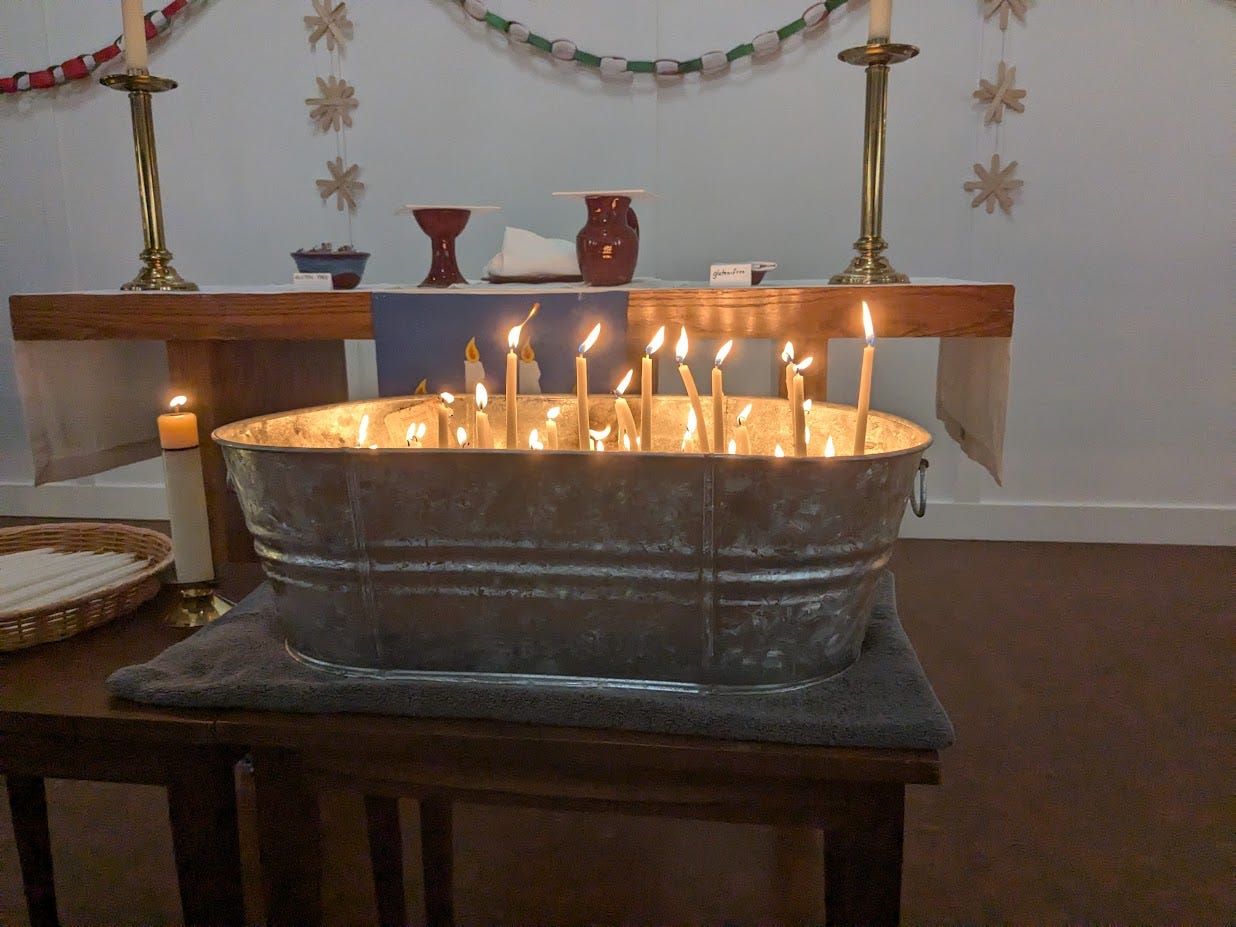About a year ago or so I had this weird dream that took place in a big sanctuary. There were three parts to the dream. It began with a celebration. Then, everyone sitting around me got up to sing in the choir and my chair kept moving to the center aisle and I kept moving it back to the side. This part repeated several times, and is very clearly a dream affirming my call to ministry. Finally, once my chair stopped moving to the center and stayed on the side, I found myself sitting on a pew, instead of a chair, and I had my legs tucked up to one side. Very visible on the back of my pants’ leg, over my calf, were three big, bright red splotches of blood, and now there’s a woman in the pew behind me who sees them. This part of the dream took me longer to understand, because I got caught up in these bloody wounds that were bleeding through my pants’ leg. However, what I finally figured out was that the importance was on my wounds being seen. My pain was not being ignored or glossed over or diminished. Instead, it was recognized. It was seen.
We are here tonight because our pain needs witnessing. It needs witnessing in order to lessen the sting a little bit. Not for 100% healing, not to erase what happened, but to bear witness, to tell the story, to name what has happened and to be heard. I’m in a women’s clergy group facilitated by two therapists and one of them commented at our last meeting that she is convinced that you can’t heal until you’re really heard. Feeling heard, feeling seen, is important to our healing and recovery process. Validation and affirmation that our pain is real, that our grief is real, that our love is real is important and often relieving. Sometimes we can think we’re going crazy or wonder if we’re overreacting, or be told that we “should be over it by now.” And that all undermines our experiences and our emotions.
This past year I worked in outpatient mental health chaplaincy with Veterans at the VA, much of it in grief counseling. I still remember one Vietnam Veteran who I met with in the months following his wife’s death. He wanted to, and needed to, keep talking about his wife, although his daughter didn’t want to hear it. For her, it was keeping her from moving on. But multiple times, he said to me something to the effect of, “Not talking about Vietnam near enough killed me. So, I’m going to talk about her.” His daughter wasn’t a willing audience, so he talked with me about her, and with his pastor and a couple other relatives. Sometimes we look to be heard and seen from people who aren’t willing to do so. Keep looking. The pastors here, the Stephen Ministers, we want to hear it. And if you keep looking, then hopefully you’ll find someone among your friends and family. It’s important to find your people who make you feel seen and heard.
We are here tonight to be seen. We are witnesses to each other’s stories. The prophet Isaiah wrote, “The people walking in darkness have seen a great light; a light has shined on those who lived in deep darkness.” When a light shines on you, as it did also on the shepherds in the fields with their sheep, then not only do you see the light, but you and the people around you are also illumined. You can see each other in a way you couldn’t before. This evening we keep the lights a little dimmer. This evening is not about bright lights, but it is about seeing and hearing.
I’m reading an artist’s book and just last night I began a chapter on artistic blocks. The author said, “As mental health experts are quick to point out, in order to move through loss and beyond it, we must acknowledge it and share it.” Not doing so creates scar tissue that blocks growth and access to one’s creativity. I think this happens outside the artistic world, too. Not acknowledging our experiences and not sharing them with receptive audiences creates blocks and scar tissue. Think of broken bones that aren’t set and so they don’t heal as well as they could. The body will work to heal itself, but can be aided by splints and other devices so that it regains more function than it might otherwise.
So, that is why we are here tonight. We are here to see the great light of a single candle. And to see that candle bloom into more candles. We are here to give witness to our pain and our grief. Things that went sideways, that turned out poorly, to not just honor the memory of our loved one but to honor our love for them that still exists. We are not here to fix or advise or set each other straight. We’re here to listen and worship and bear witness to the light that we have seen. To see and hear one another, as well as in turn, be seen and heard ourselves. Thanks be to God. Amen.




